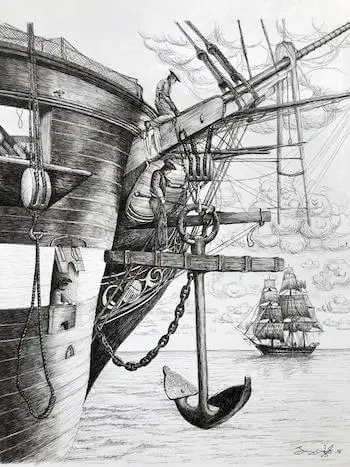Said in preparation of getting underway, especially of a ship.
Anchors aweigh
What's the meaning of the phrase 'Anchors aweigh'?
What's the origin of the phrase 'Anchors aweigh'?
There is some doubt in the public mind as to how this phrase should be spelled. Internet searches for ‘anchors away’ bring up many thousands of hits. The correct spelling is ‘anchors aweigh’. As with other frequently seen misspellings, like ‘baited breath‘ and ‘just desserts‘, the ‘away’ version does make some intuitive sense. The supposed shout of ‘anchors away’ fits well with the image of ropes being cast off and the anchor being hoisted as a ship prepares to sail away across the sea. There’s some justification for assuming the ‘away’ spelling, as the first known usage of the term in print comes from John Smith’s A Sea Grammar, 1627, in which Smith uses that form:
‘What is the Anchor away?’
The meaning of the word was nevertheless not the current ‘away – removed to a distance’, but rather the ‘aweigh – being weighed’ meaning.
The word ‘aweigh’ or, as it was often spelled in early citations, ‘a-weigh’, is now only used in this little phrase. An anchor that is aweigh is one that has just begun to put weight onto the rope or chain by which it is being hauled up. Sailors were fond of adding ‘a’ to words to make new ones, for example, ‘astern’, ‘aboard’, ashore’, ‘afloat’, ‘adrift’, ‘aground’, etc.
‘A-weigh’ is synonymous with the old and now defunct terms ‘a-peak’ and ‘a-trip’. ‘A-peak’ was the Anglicized version of the French ‘a pic’, that is, vertical. It is easy to see why the French chose the word vertical to describe an anchor which was being hauled onboard ship. ‘A-trip’ just meant ‘about to be underway’, that is, ‘on a trip’. This wasn’t only reserved for anchors; ‘a-trip’ was a general sailing term that was used for anything that was about to begin.
Admiral William Henry Smyth, in his nautical dictionary The Sailor’s Word-Book: an alphabetical digest of nautical terms, 1867, listed this entry for ‘A-trip’:
“The anchor is a-trip, or a-weigh, where the purchase has just made it break ground, or raised it clear. Sails are a-trip when they are hoisted from the cap [a thick block of wood], sheeted home, and ready for trimming”…
and for ‘Apeek’:
“A ship drawn directly over the anchor is apeek”…
The earliest known citation that refers to an anchor being ‘aweigh’ is in an exchange between two characters in John Dryden’s The Tempest, 1670:
Trincalo: Is the Anchor a Peek?
Stephano: Is a weigh! is a weigh.
The song Anchors Aweigh was composed by Charles A. Zimmerman in 1906 with lyrics written by Alfred Hart Miles. It was adopted as the official song of the United States Navy:
Stand Navy down the field, sails set to the sky.
We’ll never change our course, so Army you steer shy-y-y-y.
Roll up the score, Navy, Anchors Aweigh.
Sail Navy down the field and sink the Army, sink the Army Grey.
Anchors Aweigh was also a popular musical comedy film of 1945, starring Frank Sinatra and Gene Kelly.
See other Nautical Phrases.
The history of “Anchors aweigh” in printed materials
Trend of anchors aweigh in printed material over time
Related phrases and meanings
Browse more Phrases
About the Author

Phrases & Meanings
A-Z
A B C D E F G H I J K L M N O P Q R S T UV W XYZ
Categories
American Animals Australian Bible Body Colour Conflict Death Devil Dogs Emotions Euphemism Family Fashion Food French Horses ‘Jack’ Luck Money Military Music Names Nature Nautical Numbers Politics Religion Shakespeare Stupidity Entertainment Weather Women Work
How did we do?
Have you spotted something that needs updated on this page? We review all feedback we receive to ensure that we provide the most accurate and up to date information on phrases.
